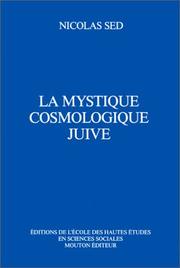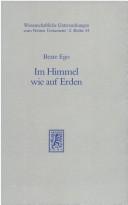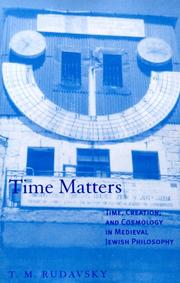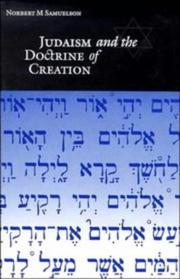| Listing 1 - 10 of 14 | << page >> |
Sort by
|
Book
Year: 1966 Publisher: Berlin : Akademie-Verlag,
Abstract | Keywords | Export | Availability | Bookmark
 Loading...
Loading...Choose an application
- Reference Manager
- EndNote
- RefWorks (Direct export to RefWorks)
Book
ISBN: 8806165682 Year: 2005 Publisher: Torino : Einaudi,
Abstract | Keywords | Export | Availability | Bookmark
 Loading...
Loading...Choose an application
- Reference Manager
- EndNote
- RefWorks (Direct export to RefWorks)
Cabala. --- Jewish cosmology. --- Kabbale --- Cosmologie juive

ISBN: 2713200733 Year: 1981 Publisher: Paris Ecole des hautes études en sciences sociales
Abstract | Keywords | Export | Availability | Bookmark
 Loading...
Loading...Choose an application
- Reference Manager
- EndNote
- RefWorks (Direct export to RefWorks)
Jewish cosmology --- Mysticism --- Rabbinical literature --- Judaism --- History and criticism
Book
ISBN: 9789351485568 9351485560 9789351485575 Year: 2021 Publisher: New Delhi Christian World Imprints
Abstract | Keywords | Export | Availability | Bookmark
 Loading...
Loading...Choose an application
- Reference Manager
- EndNote
- RefWorks (Direct export to RefWorks)
Miracles --- Jewish cosmology --- Cosmology, Ancient --- Bible. --- Criticism, interpretation, etc.
Book
ISBN: 900425966X 9789004259669 9789004259652 9004259651 Year: 2014 Publisher: Leiden Boston
Abstract | Keywords | Export | Availability | Bookmark
 Loading...
Loading...Choose an application
- Reference Manager
- EndNote
- RefWorks (Direct export to RefWorks)
The study of time, astronomy, and calendars, has been closely intertwined in the history of Western culture and, more particularly, Jewish tradition. Jewish interest in astronomy was fostered by the Jewish calendar, which was based on the courses of the sun and the moon, whilst astronomy, in turn, led to a better understanding of how time should be reckoned. Time, Astronomy, and Calendars in the Jewish Tradition , edited by Sacha Stern and Charles Burnett, presents a wide selection of original research in this multi-disciplinary field, ranging from Antiquity to the later Middle Ages. Its variety of approaches and sub-themes reflects the relevance of astronomy and calendars to many aspects of Jewish, and more generally ancient and medieval, culture and social history. Contributors include: Jonathan Ben-Dov, Reimund Leicht, Marina Rustow, Francois de Blois, Raymond Mercier, Philipp Nothaft, Josefina Rodriguez Arribas, Ilana Wartenberg, Israel Sandman, Justine Isserles, Anne C. Kineret Sittig, Katharina Keim, and Sacha Stern
Jewish calendar --- Jewish astronomy --- Jewish cosmology --- Cosmology, Jewish --- Cosmology --- Astronomy, Jewish --- Hebrew astronomy --- Astronomy --- Calendar, Hebrew --- Calendar, Jewish --- Hebrew calendar --- Calendar --- Jewish chronology --- History

ISBN: 3161454030 9783161454035 Year: 1989 Volume: 34 Publisher: Tübingen Mohr Siebeck
Abstract | Keywords | Export | Availability | Bookmark
 Loading...
Loading...Choose an application
- Reference Manager
- EndNote
- RefWorks (Direct export to RefWorks)
Jewish cosmology --- Heaven --- Rabbinical literature --- History. --- Judaism --- History of doctrines. --- History and criticism. --- 296*64 --- Joods messianisme en apocalyptiek --- Theses --- 296*64 Joods messianisme en apocalyptiek --- Cosmology, Jewish --- Cosmology --- Future life --- Judaism&delete& --- History of doctrines --- History --- History and criticism --- Jewish cosmology - History. --- Heaven - Judaism - History of doctrines. --- Rabbinical literature - History and criticism.
Book
ISBN: 0856680524 0856680451 0856680273 9780856680274 9780856680458 9780856680526 Year: 1976 Publisher: Warminster [Eng.] : Aris & Phillips,
Abstract | Keywords | Export | Availability | Bookmark
 Loading...
Loading...Choose an application
- Reference Manager
- EndNote
- RefWorks (Direct export to RefWorks)
Shabbetai Donnolo was a Jewish doctor born in Southern Italy in 913 AD when it was part of the Byzantine Empire. He is best known as the author of a herbal and traditionally as one of the founders of Europe's first medical school at Salerno. However, his medical reputation has overshadowed his cosmological writings, the most important of which is his Sefer Hakhmoni , a title implying Wisdom. As pharmacy and medicine in the tenth century were inextricably interwoven with astrology and cosmology Donnolo sets out his idea of a divinely created universe, with man in the image of God, based on a synthesis of contemporary thought. Professor Sharf shows how Donnolo's cosmology is a striking blend of his mystical inheritance from the Judaism of his birth, the Christian culture of his homeland and the Islamic astronomy which he studied, with the down-to-earth, plain and practical mind of the doctor.
Cabala. --- Jewish astrology. --- Jewish cosmology. --- Kabbale --- Astrologie juive --- Cosmologie juive --- Donnolo, Shabbetai, --- Sefer Yezirah. --- Apedemak (Egyptian deity) --- Meroë (Sudan) --- Apedemak (Egyptian deity). --- Meroe (Extinct city) --- Religion. --- Cabala --- Jewish astrology --- Jewish cosmology --- Donnolo, Shabbetai, - 913-approximately 982. - Sefer ḥakhmoni --- Sefer Yeẓirah.

ISBN: 0791493253 9780791493250 9780791444542 0791444546 0791444538 0791444546 9780791444535 Year: 2000 Publisher: Albany State university of New York press
Abstract | Keywords | Export | Availability | Bookmark
 Loading...
Loading...Choose an application
- Reference Manager
- EndNote
- RefWorks (Direct export to RefWorks)
Traces the development of the concepts of time, cosmology, and creation in medieval Jewish philosophy.
Jewish cosmology. --- Creation --- Time. --- Philosophy, Medieval. --- Jewish philosophy. --- Hours (Time) --- Geodetic astronomy --- Nautical astronomy --- Horology --- Medieval philosophy --- Scholasticism --- Jews --- Philosophy, Jewish --- Philosophy, Israeli --- Cosmology, Jewish --- Cosmology --- History of doctrines. --- Philosophy --- Jewish cosmology --- Jewish philosophy --- Philosophy, Medieval --- Time --- History of doctrines --- Creation - History of doctrines
Book
ISBN: 1282949241 9786612949241 9004181105 9789004181106 9789004167629 9004167625 9781282949249 6612949244 Year: 2010 Publisher: Leiden Boston Brill
Abstract | Keywords | Export | Availability | Bookmark
 Loading...
Loading...Choose an application
- Reference Manager
- EndNote
- RefWorks (Direct export to RefWorks)
Sefer Hakhmoni by the 10th-century Jewish polymath Shabbatai Donnolo is one of the first texts written in Hebrew in medieval Europe and one of the most important documents of the “Hebrew Renaissance” of Byzantine Jewry in southern Italy between the 9th and the 11th centuries. Written as a commentary on Sefer Yeîirah (Book of Formation, an anonymous text probably written in Palestine between the Third and the 6th centuries), Sefer Hakhmoni is in fact a much more complex work, consisting of biblical exegesis, astrology, medicine, a detailed analysis of the neo-Platonic idea of melothesia , and the correspondence between the elements of the microcosm and macrocosm. This volume offers the critical text, an annotated English translation, and a comprehensive introduction to Donnolo and his works.
Cabala. --- Jewish astrology. --- Jewish cosmology. --- Cosmology, Jewish --- Cosmology --- Astrology, Jewish --- Astrology --- Cabbala --- Jews --- Kábala --- Kabalah --- Kabbala --- Kabbalah --- Qabalah --- Jewish literature --- Magic --- Mysticism --- Cabala --- Judaism --- Donnolo, Shabbetai, --- Sefer Yeẓirah. --- Sepher Jeṣirah --- Yetzirah --- Yezirah --- Yetsirah --- Sepher Yetzirah --- Sfr Isiré --- Yeẓirah, Sefer --- Sefer Yetsirah --- Book of Formation --- Sepher Yezirah --- Sefer Yetzirah --- Book of Creation --- Sefer Jecira --- Chronicles of desire --- Sefer Yetzira --- Sefer Yeṣirah --- ספר יצירה --- Jewish astrology --- Jewish cosmology --- Donnolo, Shabbetai, - 913-approximately 982. - Sefer ḥakhmoni

ISBN: 0521452147 0521046858 051159819X Year: 1994 Publisher: Cambridge : Cambridge University Press,
Abstract | Keywords | Export | Availability | Bookmark
 Loading...
Loading...Choose an application
- Reference Manager
- EndNote
- RefWorks (Direct export to RefWorks)
The topic of this book is 'creation'. It breaks down into discussions of two distinct, but interrelated, questions: what does the universe look like, and what is its origin? The opinions about creation considered by Norbert Samuelson come from the Hebrew scriptures, Greek philosophy, Jewish philosophy and contemporary physics. His perspective is Jewish, liberal and philosophical. It is 'Jewish' because the foundation of the discussion is biblical texts interpreted in the light of traditional rabbinic texts. It is 'philosophical' because the subject matter is important in both past and present philosophical texts, and to Jewish philosophy in particular. Finally, it is 'liberal' because the authorities consulted include heterodox as well as orthodox Jewish sources. The ensuing discussion leads to original conclusions about a diversity of topics, including the limits of human reason and religious faith, and the relevance of scientific models to religious doctrine.
Cosmologie judaïque --- Cossmology [Jewish ] --- Filosofie [Joodse ] --- Jewish cosmology --- Jewish philosophy --- Joodse filosofie --- Joodse kosmologie --- Kosmologie [Joodse ] --- Philosophie juive --- Philosophy [Jewish ] --- 296*63 --- Philosophy, Jewish --- Creation --- -Rabbinical literature --- -Hebrew literature --- Jewish literature --- Biblical cosmogony --- Cosmogony --- Natural theology --- Teleology --- Beginning --- Biblical cosmology --- Creation windows --- Creationism --- Evolution --- Jews --- Philosophy, Israeli --- Cosmology, Jewish --- Cosmology --- Joodse theologie en filosofie--in de moderne en hedendaagse tijd --- History of doctrines --- History and criticism --- Philosophy --- -Joodse theologie en filosofie--in de moderne en hedendaagse tijd --- 296*63 Joodse theologie en filosofie--in de moderne en hedendaagse tijd --- -Jews --- Rabbinical literature --- Jewish cosmology. --- Creation - History of doctrines. --- Arts and Humanities --- Religion --- Jewish philosophy. --- History of doctrines. --- History and criticism.
| Listing 1 - 10 of 14 | << page >> |
Sort by
|

 Search
Search Feedback
Feedback About UniCat
About UniCat  Help
Help News
News